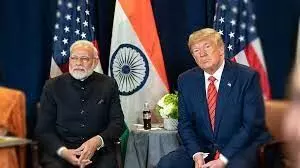Why is the US-India Trade Deal Delayed? Will It Impact Indian Equity Markets? All You Need to Know
The US-India trade deal has been left in the lurch, despite repeated claims from both sides in recent months.
Why is the US-India Trade Deal Delayed? Will It Impact Indian Equity Markets? All You Need to Know

The US-India trade deal has been left in the lurch, despite repeated claims from both sides in recent months.
Over the last few days, the US has signed agreements with various countries, including Japan and the European Union (EU).
In May the US and China signed a tariff and export control agreement with an August 12 deadline. Experts say that the deadline may be extended.
However, there has been no major development in the US-India trade deal. As per reports, Trump on July 29 hinted on imposing a 20-25% tariff on Indian imports.
Last Thursday, July 24, the Ministry of External Affairs (MEA) said India and the US are working towards finalising the “first tranche of a mutually beneficial, multi-sector Bilateral Trade Agreement (BTA).”
Why is the India-US trade deal getting delayed?
Hopes were high that a trade agreement between US and India would be finalised before July 9. However, despite several rounds of talks and reports suggesting that President Trump was expected to take a final call, the deal couldn’t be finalised.
A pain point causing friction between the two counterparts is the US’s insistence on greater access to Indian markets for its agricultural, dairy, and genetically modified (GM) products. India, however, has pushed back, arguing that such access could hurt the livelihoods of its farmers.
“The US wants more access to India’s agriculture market, particularly dairy products. India cannot and is unwilling to negotiate on this. Animal farming in India is a source of livelihood for millions, not a large-scale industry like in the Western world,” VK Vijayakumar, Chief Investment Strategist at Geojit Investments, noted.
Additionally, India is also aiming at seeking lower tariff rates to gain a competitive edge over its Asian peers.
Another major reason that is causing a roadblock in the trade deal is the US’s harsh stance against those countries importing oil from Russia.
Can the deal be finalised?
According to experts, the trade deal between India and Pakistan may get finalised, even though it may take time and may even go beyond the August 1 deadline.
Following August 1, tariffs on Indian imports to the US will increase to 26%.
US representatives are set to visit India on 25 August 2025 for the next round of trade negotiations, PTI reported.
“We believe that signing a trade deal amicably with India is equally important for the US for geopolitical compulsions. Therefore, we still hope that India would avoid any major risk on this front,” G Chokkalingam, the founder and head of research at Equinomics Research Private Limited, observed.
Can a delay in the US-India trade deal impact the stock market?
A delay in the trade deal can be detrimental to Indian equity markets due to the country's widening trade deficit, giving a major blow to the economy and the domestic currency.
“If India signs a deal with the US and averts the 26 per cent reciprocal duties, then the market is likely to recover significantly. In case reciprocal duty is imposed, then the market is likely to remain weak in the short-term,” said Chokkalingam.
A trade deal likely increases FPI inflows in the domestic equity market.
“Over the medium term, this could encourage increased FPI inflows into sectors like manufacturing, technology, and healthcare, particularly if supported by supply chain diversification and the ongoing 'China+1' strategy. Such a deal would also signal long-term economic stability and global integration, key factors for long-duration foreign investors,” Aditya Sood, a fund manager at InCred Asset Management, told Mint.

